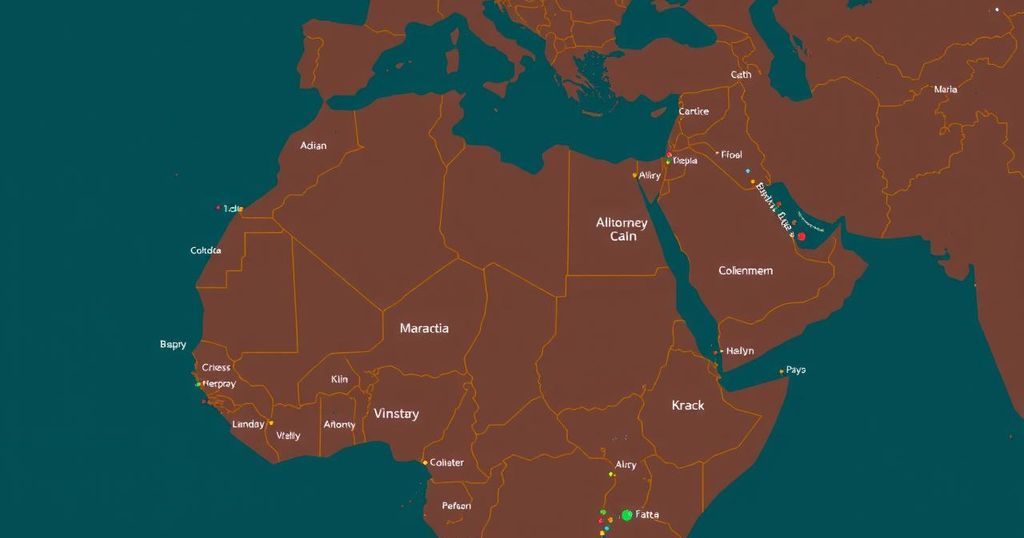The ‘Brave for Peace’ program has been launched to combat violent extremism in Kenya, Somalia, and South Sudan with a financial commitment of Sh2.3 billion over 36 months. Spearheaded by the UNDP and funded by KOICA, the initiative emphasizes local solutions to root causes of conflict. Officials acknowledge the increasing threat of extremist groups exploiting social grievances and appeal to vulnerable populations, with a focus on fostering resilience and sustainable peace in the region.
A new initiative aimed at enhancing community resilience against violent extremism and conflict in Kenya, Somalia, and South Sudan has been launched with a significant investment of Sh2.3 billion (approximately USD 18 million). This program, dubbed ‘Brave for Peace,’ will focus on local solutions for issues contributing to instability, such as economic deprivation and political unrest, over a period of 36 months. The United Nations Development Programme (UNDP) will oversee the implementation in collaboration with funding from the Korea International Cooperation Agency (KOICA). During the launch event, the Principal Secretary for Interior, Raymond Omollo, highlighted the persistent challenges Kenya faces despite its relatively stable peace status compared to some regional neighbors. He remarked that extremist activities have occasionally been witnessed, referencing the shocking Shakahola massacre as a stark reminder of the threats posed by religiously motivated violence. Omollo emphasized that such challenges are not exclusively confined to any single religion. Similarly, Abdullahi Mohamed Nur, Director of the Tusban Centre in Somalia, discussed how Al-Shabaab manipulates religious sentiments to justify their criminal actions, which harm both Kenyan and Somali communities. He stressed that the group’s activities are rooted in broader conflicts rather than solely religious divisions. The rise in violent extremism over the last decade has raised alarms, as noted by the Deputy Director of IGAD’s ICEPCVE, Mohamed Houmed. He stated that autonomous extremist groups, including Al-Shabaab, exploit socioeconomic grievances and governance gaps to recruit vulnerable individuals, especially the youth. Furthermore, Songi Han, Deputy Director of KOICA, emphasized the project’s importance in addressing issues particularly affecting marginalized groups, including children and women, who are disproportionately impacted by violent extremism. In South Sudan, while the immediate threat of violent extremism may be less pronounced, challenges such as climate-induced insecurity and communal conflict remain pressing. The overall initiative represents a timely and essential intervention aimed at fostering sustainable peace and stability across these East African nations.
The article discusses a new initiative, ‘Brave for Peace,’ which addresses the critical issue of violent extremism and conflict in Kenya, Somalia, and South Sudan. The backdrop includes a significant increase in extremist activities in East Africa, particularly from groups like Al-Shabaab, which exploit local grievances and vulnerabilities. The project aims to build community resilience by tackling underlying socio-economic and political issues that may lead to conflict. Implemented by the UNDP with support from KOICA, this program is positioned as a comprehensive approach to peacebuilding in the region over the next three years.
In conclusion, the ‘Brave for Peace’ initiative is a vital step towards reinforcing community resilience against violent extremism and fostering peaceful coexistence in Kenya, Somalia, and South Sudan. With a substantial investment and a focus on local solutions to entrenched socio-political grievances, the program aims to mitigate the factors contributing to conflict while addressing the vulnerabilities of marginalized populations. As the region grapples with the pervasive threat of extremism, this collaborative effort underlines the importance of sustainable peace-building strategies.
Original Source: eastleighvoice.co.ke






